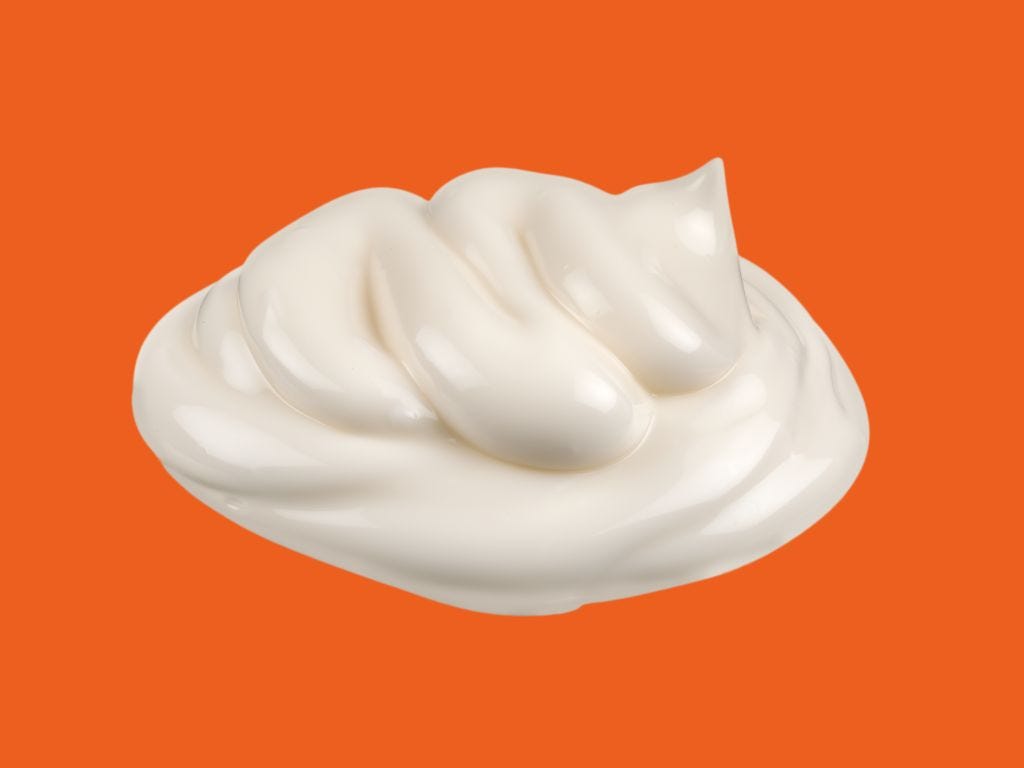Emulsifiers like lecithin and carboxymethylcellulose are everywhere, from ice cream to flavoured milk, keeping foods smooth and shelf‑stable.
Toxicology tests clear them as safe, yet these tests don’t probe their effects on the gut microbiome.
And that’s where new concerns are starting to emerge.
Are emulsifiers anything to worry about?
And if so, which ones?
What we’ll cover today:
What emulsifiers are and why they’re used
Are emulsifiers bad for you, or is it more complicated?
Do emulsifiers affect the gut microbiome, heart health, cancer and metabolism, and which ones?
Emulsifiers: avoid or harmless? 7 things you need to know (plus a free tool to check which ones are in your food) (paid subscribers)
What are emulsifiers and why are they used?
Emulsifiers are added to foods to help mix ingredients that don't naturally blend well, like oil and water.
They prevent these ingredients from separating, keeping the texture smooth and consistent.
That texture is often creamier and more indulgent. Emulsifiers also help extend a food’s shelf life and make large-scale production easier.
Some emulsifiers come from natural ingredients like egg yolks or soy, while others are made in a lab.
Lethicin is the most common emulsifier (often found in chocolate and baked goods), present in 14% of EU foods.
Are emulsifiers bad for you?
International agencies, like EFSA (EU), the FDA (US) and FSANZ (Australia/NZ), check the safety of every emulsifier.
“Natural” emulsifiers vs. lab-made ones, aren’t automatically "safe” or "harmful". It depends on the specific compound, as each emulsifier is chemically unique.
Scientists test them in animals at high doses to check for harm, like organ damage or cancer, and also study how cells respond in lab-based experiments.
They calculate the highest dose in animals that shows no harmful effect, and set the safe limit for humans at 100 times lower, to allow a wide margin of safety.
The idea is, even if you eat foods with emulsifiers every day, the levels allowed in food should still be far below what might cause harm.
However, these checks rarely look at the effect of emulsifiers on the gut microbiome, which is a newer area of research - and that could matter.
What does the research in humans say?
There are only a few human studies so far, and most from the same large French cohort. They looked at how often people ate emulsifiers, how much they ate, and whether they later developed certain diseases.
These types of studies can’t prove that emulsifiers cause illness, but they can show patterns worth testing in controlled trials.
Heart disease: Several emulsifiers (out of 37) were linked to a slightly higher risk, around 3 to 11% higher, for those eating the most emulsifiers. Most emulsifiers weren’t linked at all.
Type 2 diabetes: The link was a bit stronger here. Some common gum-based emulsifiers like xanthan gum, guar gum, gum arabic, and carrageenan were tied to a higher risk.
Cancer: Most weren’t linked to cancer. But in this observational research, a few, like carrageenan and mono- and diglycerides, were linked with a higher risk of breast and prostate cancer.
These studies suggest there may be a small raised risk for people who eat higher-than-average amounts of certain emulsifiers, but the evidence isn’t strong enough to show direct harm.
Eating emulsifiers occasionally or in normal amounts likely isn’t something to worry about - though scientists are still learning more about their long-term effects.
For people with Crohn’s disease, a new study from King’s College London suggests that cutting back on certain emulsifiers may help ease symptoms. But it hasn’t been published yet and needs to go through peer review.
Are emulsifiers bad for your gut microbiome?
Many emulsifiers aren’t absorbed by the body, so if they affect our health, it’s likely through the gut.
Studies in mice and in lab setups that mimic the human gut give us clues about how emulsifiers may affect the gut microbiome. At the moment, we only have one tightly controlled study in humans, and it looked specifically at carboxymethylcellulose (CMC).
In mice, some emulsifiers have been shown to disrupt the gut microbiome and trigger inflammation. It’s not all bad news though, a handful of studies suggest that some emulsifiers may even benefit the gut microbiome.
Twenty emulsifiers have been tested in models of human guts. Most changed the microbiome in some way, but polysorbate 80 and CMC had the strongest effects. Others, like the most common emulsifier lecithin, had little to no impact.
In the human study, CMC lowered microbiome diversity and caused some digestive discomfort, like bloating. But unlike in mice, it didn’t clearly trigger inflammation or cause major shift in the overall makeup of the gut microbiome.
So some emulsifiers have been shown to affect the gut microbiome in animals and lab studies, but we don’t yet know how much this matters for humans.
Animal and lab studies are useful for spotting potential risks, but they don’t always reflect what happens in real life. It's also worth noting that animal studies often use doses much higher than people would normally eat.
We still need more human studies. For now, we’re only beginning to understand how emulsifiers might affect the gut microbiome in real life.
How common are these emulsifiers?
Researchers in the UK analysed 12,844 ultra-processed supermarket foods and found that just over 50% contained emulsifiers.
Top three most common emulsifiers:
Lecithin (E322): in 23.4% of all products
Mono- and diglycerides of fatty acids (E471): in 14.5%
Diphosphates (E450): in 11.6%
What about CMC and Polysorbate 80?
Emulsifiers like carboxymethylcellulose and Polysorbate 80 are rarely present.
Carboxymethylcellulose (E466) was found in only 179 products (1.4%)
Polysorbate 80 (E433) was found in only 8 food products (0.06%)
The verdict on emulsifiers
If you’re wondering whether to avoid emulsifiers altogether or just be selective, here are 7 key things you need to know (plus a free tool to check which ones are in your food).
Keep reading with a 7-day free trial
Subscribe to Second Brain to keep reading this post and get 7 days of free access to the full post archives.









